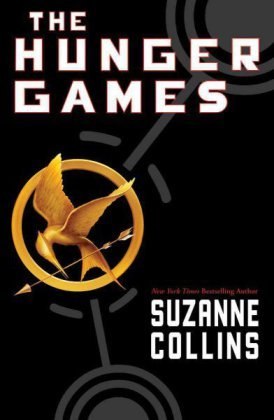The Hunger Games
by Suzanne Collins
A remarkable book and a small cultural phenomenon and apparently what every literary reviewer’s 14-year-old daughter is reading. Those 14-year olds are having a hell of a good time, because Collins knows how to drive plot. Even if you know where this is leading – it’s not hard to stay three or four moves ahead – the saga is terrifically exciting. And Collins has an exact ear for violence and desire, showing exactly enough to redeem our attention (because witnessing terrible events must not be a walk in the park) but not turning our stomachs.
Collins is masterful in finding ways for her protagonists to survive in combat and yet not to become monsters. Nor are all the opponents ghastly, though some are. We meet one girl who is insane with sadism, and I do wish we’d gotten to know her well enough to explain her. Is she Piggy in Lord of the Flies, or Hannibal Lecter, or just a desperate little girl who has come unhinged? Collins does manage to tell us a lot about “Foxface”, an enemy with whom we never exchange a word but whom we get to know quite well and, eventually, to admire. If Harry Potter, at its best, delighted us with surprises, The Hunger Games sets up wonderful moments, long anticipated but still somehow fresh.
The following quibbles should not deter you from reading the book, but invite discussion amongst people who have. I find the review literature surprisingly thin and superficial, but no doubt I have been looking in the wrong places.
Collins’s world building is adequate but occasionally surrenders plausibility to the perceived needs of her audience. The central conceit of punitive gladiatorial games as a tool for subjugating the conquered provinces makes no political sense, and the oppressive surveillance society (and Soviet-style planned economy) into which our hero is born seems an arbitrary response to life after the ecological apocalypse. Our home in District 12 is literally dirt poor, a coal mining enclave in what used to be Appalachia. Most of the population is malnourished. People frequently starve to death on the town streets. It’s a place where an orphaned 12-year-old girl needs to learn quickly how to feed her family on dandelion greens and wild squirrels. But when that girl has the bad luck to be chosen for the Hunger Games and is sent to the Capitol, she suddenly knows a lot about about skin moisturizer and automatic showers and syringes. Somehow she knows how to walk in heels and to wear strapless gowns. One day we learn that she’s never tasted hot chocolate; two days later, she orders up a snack of duck liver paté. This is substituting the reader’s knowledge for the protagonist’s.
The world of The Hunger Games is sometimes thinly inhabited. The annual gladiatorial contest is compulsory viewing for the entire nation. The spectacle is built around spectators: every moment of the games is broadcast on live television, the announcer is a famous celebrity, betting is common, and the rules permit “sponsors” to send gifts (at exorbitant expense) to participants. Children from richer districts spend years training for the games in a grim parody of the Olympics. Still, we seldom recall anything from previous games; even if they aren't great fans, kids would know something about famous victories and spectacular blunders.
This is a contemporary YA novel, and so inevitably concerns sex roles is society. What Collins has done here is very clever: The Hunger Games is a gender-swapped retelling of the origin story of Robin Hood. Katniss Everdeen plays Robin: daughter of a minor aristocrat who married a peasant for love. Collins places shopkeepers, who live “in the Town,” as gentry and miners, who live “in the Seam,” as peasants. The aristocrats who live in the distant Capitol speak with funny accents and wear peculiar clothes. We’ve got Normans and Celts and the whole shebang: William Morris would be proud. So would Marx.
Katniss/Robin is brilliant with a bow and loves the outdoors. Peeta, the District 12 boy drafted into the death-match is Maid Marian: he has silently loved Katniss since they were toddlers. He is a child of local gentry – the town baker. He has feminine accomplishments like baking and painting. He knows nothing of the hunt. But while Katniss is often at a loss for words, Peeta always knows what to say. People just like him. Their coach, a depressed alcoholic who won the Hunger Games many years ago, can only be the bibulous Friar Tuck.
This is clever, but makes me uncomfortable because, beyond the gender swap, the sex roles and the romance are so completely conventional. Swap Katniss and Peeta, and many scenes become impossibly sentimental: the strong, competent hero and the devoted admirer. I don’t imagine it’s meant to indicate that girls ought to be satisfied with traditional roles if that’s what seems in their nature, but surely the book can be read that way. There’s a certain squeamishness about bodies, too, given that so much of the character’s time is spent binding wounds or inflicting them; Katniss is always a girl but, though she thinks a lot about size, strength and agility, she almost never thinks about being female. And, although we have twenty four healthy young people confined together, often huddled together for warmth, terrified, and having little reason to worry about pregnancy or STDs or tomorrow, no one thinks of sex.
This isn’t science fiction and it’s not fantasy — the world isn’t coherent and that doesn’t much matter. It’s pure, melodramatic, romantic adventure, and a hell of a good time.
